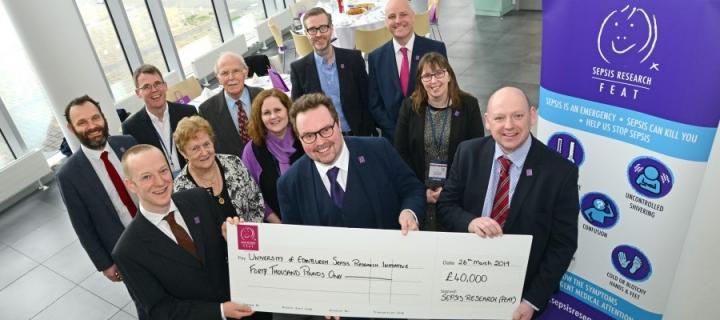Sepsis study to focus on genes in quest for treatments
Scientists will investigate the role genes play during sepsis infection thanks to funding from Sepsis Research.

Sepsis occurs when the immune system reacts to infection, causing symptoms such as cold hands and feet, mottled skin and a quickened heart rate. It can quickly lead to multiple organ failure and death. More people die from sepsis than the combined figure for breast cancer and bowel cancer.
Pioneering research is to focus on the role genes play in determining how likely people are to die from infection in the hope it will speed the search for new medicines.
Scientists say the study could help identify those most vulnerable to sepsis, which kills more than 50,000 people in the UK each year and is the leading preventable cause of death worldwide.
The study is being made possible thanks to vital funding from Sepsis Research – the UK’s first sepsis research charity – which will provide £40,000 annually.
DNA comparison
Dr Kenneth Baillie of The Roslin Institute will lead a genetic study with colleagues from the wider University of Edinburgh. The team will compare DNA from people admitted to hospital who later die from sepsis with those who survive.
They hope to isolate DNA signals from thousands of patients and use the information to identify future drug targets.
Vital funding from Sepsis Research
Sepsis Research – also known as the Fiona Elizabeth Agnew Trust or FEAT – was founded by Craig Stobo in memory of his wife Dr Fiona Agnew and their unborn daughter, Isla, who both died in 2012 after contracting the illness.
Craig developed sepsis at the same time as Fiona but made a healthy recovery. The charity is committed to funding innovative research projects to better detect those at highest risk.
Sepsis kills someone in Scotland every four hours and our charity is committed to helping find better treatments to help reduce these numbers. Our partnership with the University of Edinburgh is about looking to the future to help better understand how we can improve detection, treatment and recovery.
We know that people who have been adopted, whose biological parents have died of infection, are themselves six times more likely to die from infection. This link is not seen with adoptive parents, suggesting that genes are key to understanding sepsis treatments.
We are grateful for this vital funding from Sepsis Research (FEAT) and hope it will help us to unlock some of the clues to how DNA governs sepsis recovery.
Contact
Kate McAllister, Press and PR Office
Tel 0131 650 6357; Email Kate.McAllister@ed.ac.uk
Colin Graham, Chief Operating Officer, Sepsis Research (FEAT)
Tel 077381 72730; Email colin@sepsisresearch.org.uk


